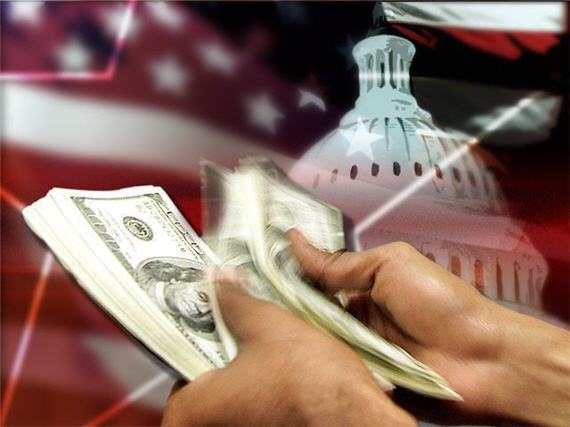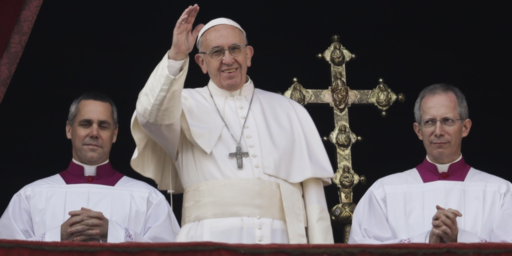American Government for Sale?
Is money the only thing that matters in post-Citizens United American politics?
The New Yorker‘s Jane Mayer examines efforts to win one North Carolina state senate seat and concludes that money is all that matters in American politics.
Former Republican National Committee chairman Ed Gillespie headed up a project called REDMAP, the aim of which is to engineer GOP takeover of state legislatures in key battleground states in the 2010 elections ahead of Congressional redistricting. Teaming up with wealthy donors, he targeted key races with large expenditures.
That fall, in the remote western corner of the state, John Snow, a retired Democratic judge who had represented the district in the State Senate for three terms, found himself subjected to one political attack after another. Snow, who often voted with the Republicans, was considered one of the most conservative Democrats in the General Assembly, and his record reflected the views of his constituents. His Republican opponent, Jim Davis—an orthodontist loosely allied with the Tea Party—had minimal political experience, and Snow, a former college football star, was expected to be reëlected easily. Yet somehow Davis seemed to have almost unlimited money with which to assail Snow.
Snow recalls, “I voted to help build a pier with an aquarium on the coast, as did every other member of the North Carolina House and Senate who voted.” But a television attack ad presented the “luxury pier” as Snow’s wasteful scheme. “We’ve lost jobs,” an actress said in the ad. “John Snow’s solution for our economy? ‘Go fish!’ ” A mass mailing, decorated with a cartoon pig, denounced the pier as one of Snow’s “pork projects.” It criticized Snow for “wasting our tax dollars,” citing his vote to “spend $218,000 on a Shakespeare festival,” but failing to note that this sum represented a budget cut for the program, which had been funded by the legislature since 1999.
In all, Snow says, he was the target of two dozen mass mailings, one of them reminiscent of the Willie Horton ad that became notorious during the 1988 Presidential campaign. It featured a photograph of Henry Lee McCollum, a menacing-looking African-American convict on death row, who, along with three other men, raped and murdered an eleven-year-old girl. After describing McCollum’s crimes in lurid detail, the mailing noted, “Thanks to arrogant State Senator John Snow, McCollum could soon be let off of death row.” Snow, in fact, supported the death penalty and had prosecuted murder cases. But, in 2009, he had helped pass a new state law, the Racial Justice Act, that enabled judges to reconsider a death sentence if a convict could prove that the jury’s verdict had been tainted by racism. The law was an attempt to address the overwhelming racial disparity in capital sentences.
[…]
After the election, the North Carolina Free Enterprise Foundation, a nonpartisan, pro-business organization, revealed that two seemingly independent political groups had spent several hundred thousand dollars on ads against Snow—a huge amount in a poor, backwoods district. Art Pope [the chairman and C.E.O. of Variety Wholesalers, a discount-store conglomerate] was instrumental in funding and creating both groups, Real Jobs NC and Civitas Action. Real Jobs NC was responsible for the “Go fish!” ad and the mass mailing that attacked Snow’s “pork projects.” The racially charged ad was produced by the North Carolina Republican Party, and Pope says that he was not involved in its creation. But Pope and three members of his family gave the Davis campaign a four-thousand-dollar check each—the maximum individual donation allowed by state law.
Snow, whose defeat was first chronicled by the Institute for Southern Studies, a progressive nonprofit organization, told me, “It’s getting to the point where, in politics, money is the most important thing. They spent nearly a million dollars to win that seat. A lot of it was from corporations and outside groups related to Art Pope. He was their sugar daddy.”
Offering much less detail, she points to a couple other races in North Carolina that were similarly targeted an then tells us:
According to an analysis by the Institute for Southern Studies, of the twenty-two legislative races targeted by him, his family, and their organizations, the Republicans won eighteen, placing both chambers of the General Assembly firmly under Republican majorities for the first time since 1870. North Carolina’s Democrats in Congress hung on to power, but those in the state legislature, where Pope had focussed his spending, were routed.
The institute also found that three-quarters of the spending by independent groups in North Carolina’s 2010 state races came from accounts linked to Pope. The total amount that Pope, his family, and groups backed by him spent on the twenty-two races was $2.2 million—not that much, by national standards, but enough to exert crucial influence within the confines of one state. For example, as Gillespie had hoped, the REDMAP strategy worked: the Republicans in North Carolina’s General Assembly have redrafted congressional-district boundaries with an eye toward partisan advantage.
Experts predict that, next fall, the Republicans will likely take over at least four seats currently held by Democrats in the House of Representatives, helping the Party expand its majority in Congress. Meanwhile, the Republican leadership in the North Carolina General Assembly is raising issues that are sure to galvanize the conservative vote in the 2012 Presidential race, such as a constitutional ban on gay marriage.
Not surprisingly, Democrats are miffed and questioning how democratic such a process is. Pope dismisses this as nonsense.
Pope said that he was particularly affronted when “people throw around terms like ‘So-and-So tried to buy the election.’ ” In his view, such language evokes “images of actually bribing someone when they vote . . . or bribing a legislator after they’re elected. That’s illegal, that’s corrupt, and that’s something I’ve fought very hard against in North Carolina.” Pope sees himself as a reformer. The money that he spends on politics, he said, strengthens American democracy, by providing voters with more information and more choices: “Most of the efforts that I or my company have supported have been to get the message out on the issues, so that voters can make an informed choice.” He added, “To donate money, or make an independent expenditure to educate voters on the issues, or on voting records of the incumbents—I mean, it helps citizens make informed decisions! It’s the core of the First Amendment!” Asked whether candidates with the biggest budgets might drown out less wealthy candidates, he said, “I really have more faith in the North Carolina voters than that.”
Martin Nesbitt, Jr., the Democratic leader in the North Carolina Senate, says of Pope’s arguments, “Look at his ads and tell me what’s informative about them. They’re simply spewing right-wing stuff at voters, saying, ‘They raise taxes, they raise taxes, they raise taxes.’ ” Of Pope’s spending in 2010, he says, “It wasn’t an education; it was an onslaught. What he’s doing is buying elections.”
I’m somewhat skeptical of the “buying elections” charge. After all, very wealthy candidates have mostly failed spectacularly at getting themselves elected to statewide office. And I’ve certainly seen plenty of local races where candidates spend large sums of money on negative advertising only to have it backfire. Further, the notion that this somehow gives Republicans a major advantage is rather belied by the massive fundraising machine that Barack Obama assembled in 2008 and that looks on course to raise over a billion dollars this cycle.
Still, it’s quite troubling to see massive outside expenditures in local races. These contests have typically been under the radar of major media outlets even at the state level. Even people who follow politics closely know little about the candidates, typically relying on word of mouth, a vague sense of the incumbent’s reputation, and party ID. If one candidate is being bombarded with negative advertising and lacks the ability to get his message out, the playing field is far from level.
Stipulating that Mayer is sympathetic to Democrats and is telling only one side of the story in the Snow-Davis race, it certainly seems like a sad state of affairs. While I firmly believe that people like Pope have every right to participate in the political process and help candidates and parties of their own choosing, I also believe people have a duty to act honorably. While politics ain’t beanbag and a certain amount of hyperbole is part of the game, outright lies about someone’s record is beyond the pale.
It’s not at all clear what can be done about any of this. Mayer and the Democrats continually point to Citizens United and the ability of corporations to funnel unlimited funds into politics but that was preceded by nearly four decades of efforts to regulate the flow of money into politics failing miserably. Every attempt to limit donations and advertising was met with a creative exploitation of the law. If anything, the situation grew worse.
Given how enormously the national government and its regulatory apparatus impacts the daily lives of people, businesses, and organizations, it’s no wonder that there’s a race between various “special interests” to influence the rules in their favor. Nor, even absent Citizens United, do I see a way of stopping or limiting this race.
Capping the amount of money spent on any given race is not only technically unfeasible but an unfair advantage for incumbents and others with very high name recognition. Ditto various public financing and “free airtime” proposals. An equal playing field is not equal at all for those who start the race several lengths behind.
One idea that I find quite appealing is limiting contributions to a particular race to those who live within the boundaries represented by the office. It’s unseemly for those who live outside a state senate district to have an influence on the outcome of that race. Ditto US House and Senate races. But, even if this rule passes Constitutional muster, I haven’t the foggiest idea how it could be enforced.







Great examples cited here. But do people really vote based on lurid propaganda that magically appears in their mail boxes? Are we THAT idiotic?!
@SpaceyG on Twitter: In a word – yes!
I don’t know much about North Carolina state politics, but it looks like over 75% of each candidate’s campaign money came from their respective parties. Arguably restricted their campaign to solely local money might have left them without resources to do much campaigning.
The problem in too many of our legislative assemblies is that a vote for a conservative Democrat usually empowers a liberal Democratic leadership and a vote for a liberal Republican usually empowers a conservative Republican leadership. I wonder if preventing parties from contributing to member campaigns would help or hurt that.
@SpaceyG on Twitter: Sadly, yes. Your reading a political blog means that you are taking more of an active interest in learning about politics than about half the entire electorate. Posting a relevant comment boosts you another 10% or so. Congratulations! Now weep for our country…
I’m surprised that there’s any controversy about whether our government at any level is up for auction. The controversy is over who gets the bid paddles.
Maybe it´s not buying elections. But forbiding out of state politicla expenditures would help.
Speak for yourself
But that’s because in almost all cases the other guy was also funded by big money. The real disparity between the overall population and our elected leaders is not one of race or religion or sex, it’s one of class. State and federal office holders are almost universally from the top quarter of americans in terms of wealth.
That’s what needs to change if we’re to have a government that can be truly representative.
Go to a system of publicly supported campaigns where only the publicly provided warchest can be used to campaign, all other political advertisements are forbidden. That would drastically level the playing field and make it more likely the person with the best message, instead of the one who can simply yell the loudest, will win. There are details to work out in terms of who would qualify for a warchest but those can and have been worked out with various degrees of success by places like Arizona and Maine.
@Dave Schuler: As Shaw said, we’re just haggling over the price, now…
@Tlaloc:
Yes, but if we did that how would Goldman Sachs continue to control this country?
Money isn’t all that matters in politics. Results are what matters. People like Art Pope can spend huge amounts of money to get their pet candidates elected but if those candidates turn out to be morons or fanatics, it’s only a matter of time before they’re swept out of office.
The problem is how much damage bought-and-paid-for elected officials do and how severe the inevitable backlash will be. For example, current GOP thinking seems to be that they can somehow rig the game to ensure perpetual Republican control of government. But even if you can rig the game…how long do you think it will last before the other side stops playing? If people can no longer have their grievances addressed through democracy, they will inevitably look for and legitimize other means.
Mike
This might be more direct evidence than poll outcomes:
Want the inside scoop on the supercommittee? Ask a lobbyist.
(Geez, this is a “government for sale” thread, and I’m the first to say “lobbyist.”)
Just running the numbers for John Snow, who raised $401,162 for his 2010 campaign. If you remove the out-of-district money, little is left:
$401,162 = TOTAL
($6,150) = Out-of-state
($368,010) = Raleigh N.C. (out-of-district)
($7,350) = Asheville N.C. (out-of-district)
($4,500) = Greensboro N.C. (out-of-district)
($2,750) = Cary N.C. (out-of-district)
($2,000) = Durham N.C. (out-of-district)
$10,402 = IN DISTRICT
Of which, $8,000 was contributed by the Eastern Band of the Cherokee Indians.
Too late. Already owned fully by Goldman Sachs, Bank of America, GE, Koch Industries, AT&T, Comcast, Time Warner, Viacom, News Corp, Boeing, and a few others.
Wyoming has no residency requirement for voting.
If 100,000 Democrats from solidly Democratic states registered to vote in Wyoming, they could elect two Democratic Senators from Wyoming.
But they don’t, because Americans don’t take politics very seriously.
One night of agony and joy every couple of years, then indifference.
Kinda like watching the Olympics.
@ponce: Plus the Democrats would have to wear cowboy hats, which just isn’t going to happen.
If Americans were as serious about politics as baseball, we would have all of its statistical devices to compare the inputs.
We might say a conservative Democratic judge in a right-leaning district has a 4.0 WAR, with an overall projected decline in performance over time, as the district will eventually return to norm and reject him. Plus judges are notoriously poor campaigners.
The Popes might have an xFIP of 3.72, depending on whether they throw money around with abandon, or carefully try to target the strike zone.
@Tlaloc: I address that in the post, though. Public financing or other “level playing field” arrangements simply mean that incumbents become even safer than they are now. They start off with a huge name recognition advantage, are much more likely to get “earned” media for free by virtue of their positions, and can use public money to campaign for office and tout the various pork projects they’re advancing.
I imagine most of the very wealthy are not interested in holding office themselves. First, there’s the pay cut – Congressional pay being what it is. Second, there’s the diminishment of their power. As it the OWS thread, you mistakenly have it in your head that the power lies in DC, while it seems clear that the government is merely a means to an end for Big Business. Finally, an officeholder only gets one vote on legislation.
Much better to buy several, less wealthy Congress members who owe their office to your contributions to their campaign budgets. That you leaves you free to make even more money, so you can afford the lobbyists you’ll need for all the other votes you want.
Guys…this is small potatoes. Really small. Think big. Read the Bloomberg piece on Koch Industries.
http://www.bloomberg.com/news/2011-10-02/koch-brothers-flout-law-getting-richer-with-secret-iran-sales.html
The Koch Bros have spent billions promoting a form of government that interferes less with their companies actions. Whether it’s think tanks like Heritage, or the Tea party which they fund heavily, they are molding Republican thought to their interests. Citizens United only makes them more powerful and citizens less powerful.
What does the world look like if they are successful? Well…while shaping the ideology of so-called conservatives they have been making illicit payments to win contracts, trading with a terrorist state, fixing prices, and neglecting safety and ignoring environmental regulations. If you want to know what the end-game of so-called republicans and de-regulation is…take a look at Koch Industries.
Yeah…government is for sale…but there’s a much bigger picture than some Representatives or Senators. It’s about a basic re-making of America…in the image of Charles and David Koch. The elected are simply their minnions.
Yes money is important but is not everything. Both sides do it and it is nothing new. On the left you have Soros, Letterman, DNC, many of the Unions, many in the media, and many others. The right has Art Pope, Rush, RNC, and many others.
IMO the left have been better organized, more groups, more very wealthy individuals than the right has. It is changing though. Also who the parties backs has been important because of the money and fund raising apparatus that come with it. The last election produced some candidates who overcame that obstacle.
@pounce You are wrong once again on your facts. One of the requirements needed to vote in Wyoming.
Resident of Wyoming and the precinct in which you register
http://soswy.state.wy.us/elections/registeringtovote.aspx
But, oh, the damage they can inflict before they are gone (i.e., every freshman Tea Party congressperson).
And this is why nothing will ever change. You continue to see this as a left vs. right issue. Who CARES which side has the most rich people? The rich people certainly don’t since THEY BUY BOTH SIDES! Don’t you get it yet? This issue has nothing to do with party and everything to do with the rich and powerful owning all of our politicians and having the rules written to serve their interests instead of the greater good’s interests.
Wasn’t there once a “Fairness Doctrine” that would’ve taken care of this problem?
Funny stuff. Sounds like something from a Kurt Vonnegut story.
I think it’s hard for those of us who are into politics to realize just how indifferent most Americans are to it.
My state currently has a hotly contested initiative on the ballot that’s being fought with nonstop commercials and both sides are claiming “out of state big business interests” are behind/against this initiative. I have no idea if that’s true, but both sides are spending enormous amounts of money.
The commercials usually run back to back and I have no idea what most voters think, but I find them hilarious.
@Hey Norm: Sure it’s a big story, but you won’t see a feature about it here. Because it undermines the core of James and Doug’s political philosophy, and so they will stick their heads in the sands and ignore it.
There’s a lot more to the “money in politics” problem than campaign finance.
And I’ve no idea how to fix it.
Our country is turning socialist everyday!
@James: Your argument implies elections are the only point where money is applied to manipulate the political process. You also have to take into account things like lucrative job offers in the private sector. Chris Dodd, Wall Street’s best friend in Congress, retired to become a Wall Street lobbyist with a multi-million dollar salary. You can’t tell me that wasn’t a case of “scratch our back and we’ll scratch yours”. In addition the net wealth of our politicians somehow seems to increase rapidly after being elected to office; somehow their investments consistently generate 100 – 13,000 percent returns.
http://governmentgonewild.org/thelist
Focusing on money in the election process ignores the numerous other ways politicians get bought off.
@Ben Wolf:
Exactly. Congresscritter does the bidding of a corp/industry while in office and then gets cushy job w/them once he/she is out of office. It happens all the damn time. It’s obviously corrupt, we all know it, and we apparently can’t do anything about it.
This actually reminded me of the Wisconsin Recall Elections a few months back and how much more money had been spent on just a couple of seats than entire elections in the past. While I am startled that elections can be manipulated (and I use that term very lightly) through money especially after the Citizens United case, I don’t see how they can reform donations and give everyone an equal advantage.
It really would be hard to enforce any kind of law that deals with money and politics especially since money is involved.
It sure looks like a sale. Just ask China. They look good where their sitting.
Just look where the real money is. I’ve been talking about our (USA) bad
choces we’ve made the last decade and it scared me then. I really thought
that the internet would bring us together. Maybe it will. I certanly hope that
it will. What should we do with our polictical leaders in office? I read a few
years ago, politics is a good thing to get into. It pays well. No education
needed. We all can see that. They should have to take a test. I wonder
if they all could pass the GED? Or a high school government test?
We have become lazy. That is what happens with a great deal of people
who get ahead of the pack. Let’s get back to being hungry. If not. We shall
soon be! (the United States of China)
Let’s do something. No matter how small. It can soon build us up to are
potential! I’ve been trying all of my life. I know how lucky we are. So just
do a little for our country. Stay hungry. I sure see it in other Countries. And
that’s what scares me.
Gregory